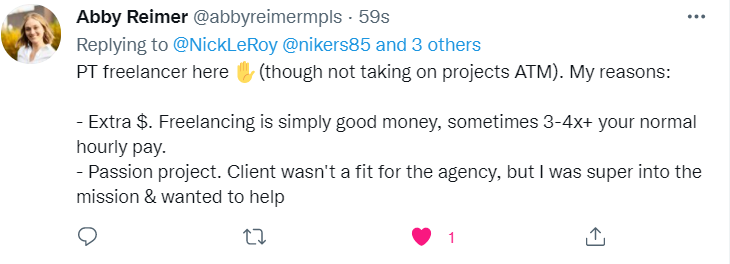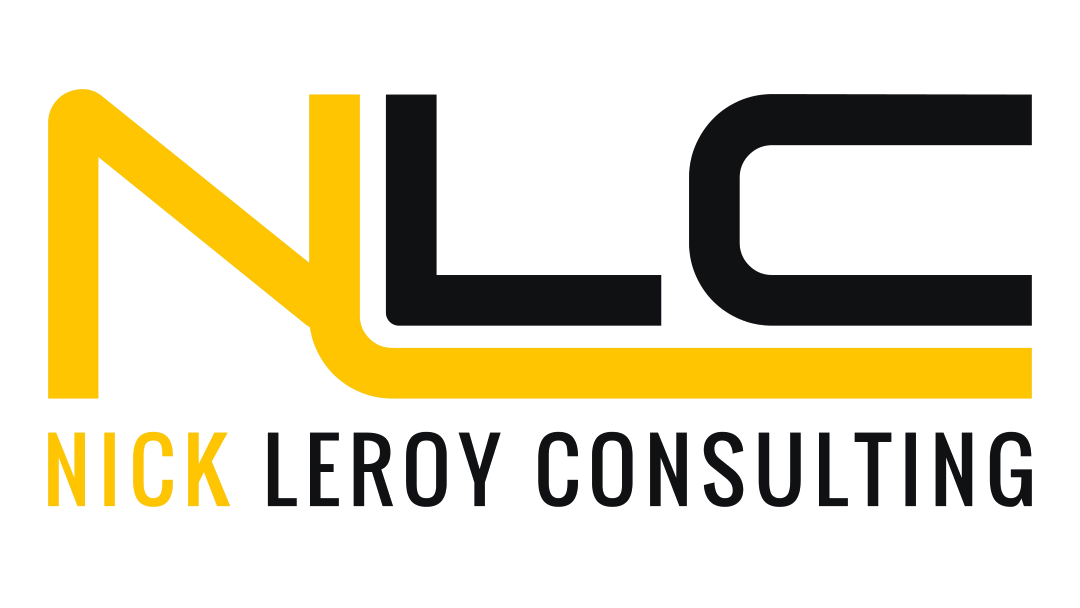As an SEO I consider myself a problem solver.
Pages not indexed? What’s stopping Google from crawling/indexing them?
Pages indexed but not ranking? What’s the state of the on-page optimization and or link profile?
Massive organic search traffic drop? Which pages and sources are being impacted most?
You’ll notice a common theme here, a goal (indexing/ranking/traffic) has been identified which allows us to work bottom-up to solve the issue.
I highly recommend this same approach with freelancing.
Why Even Freelance, Bruh?
I’m often asked how to become an SEO freelancer. In the past, I started going down a long and complicated answer that left all involved in the conversation unsatisfied. Now I respond by asking the question, why do you want to freelance?
Once you can identify the reason WHY you want to freelance you can establish goals that bring you one step closer to achieving them.
Reasons To Consider Freelancing
I’ve freelanced either part-time or full-time, as I do now, for 10+ years. Most of the time it was about money-motivated but over the years it evolved. Establishing my goals was even more important as I transitioned from part-time freelancer to full-time.
Here are my top 3 goals for freelancing:
- Money
- Work/Life Balance
- Ownership and Growth
There are so many other reasons why you may want to freelance. It might be as simple as a few extra dollars to help pay monthly bills to the flexibility of working anywhere you want.
Every person’s goals will be different and that’s OK. I’ll elaborate on my top three goals below.
Goal #1: Money
Most SEOs have a salary between $40k-$100K. Once you get to the higher levels you’ll find it difficult to continue to increase your income although salaries over 200K aren’t unheard of.
I started freelancing part-time becauset I hated the idea of my income being limited to just my salary. Freelancing allowed me opportunities as small as buying a nice meal out with friends to taking my family of five on a trip to Hawaii.
Anyone who knows me well understands I don’t like to be told NO. I’m willing to work hard to get what I want. Later on, in my career, I would start digging deeper into the value of my time, which leads me to my second priority.
Goal #2: Work/Life Balance
Let’s assume an average 9-5 job requires 2,080 hours per year. At a $70,000 salary, you are making roughly $34.00 an hour.
Granted that $34.00 is a “guarantee” (we’ll talk about this later) for each of the expected 2,080 hours you are expected to work (this accounts for average holiday/PTO time).
If you are able to command $50.00 per hour freelancing you only need 1400 hours of work to make the same $70,000.00. That’s a 30% reduction in hours.
Now that situation assumed “perfect math.” What do I mean by this? Let’s dig into it.
- It’s probably fair to assume you put in more hours if you’re eyeballing a promotion or otherwise looking to be considered a strong performer.
- The time you spent traveling to the office and or client locations.
- Most companies have after-hour events. While they are rarely required we all know it’s in your best interest to show your face.
My point is that 9-5 jobs are rarely 40 hours per week. I was often spending 50+ hours a week away from home. Freelancing not only allows me to earn more but also gives me the flexibility in my schedule to be available to my family. This wasn’t a luxury I was often afforded when working 9-5.
Goal #3: Ownership and Growth
Earlier I mentioned the $34.00 per hour “guarantee.” I write guarantee in quotes because it’s a false sense of security. If we learned one thing from COVID-19 it’s that no paycheck is guaranteed.
Just as you should prioritize yourself and your wellbeing, a business will trim expenses and look out for itself first. I use to think being a top performer gave you a safety net from rollercoaster revenues and internal politics. In my experience, this simply isn’t true.
So if there is no such thing as a guaranteed paycheck, why not take ownership of the risk and bet on yourself? This is exactly what I did and I haven’t looked back.
I control nearly every aspect of my career now. This has been an incredibly important aspect of my freelancing journey. I decide who I work with and at what rate. I no longer sit in demeaning 1:1 meetings and most importantly I’m not told to work on projects I don’t agree with or execute a strategy I don’t approve of.
What Motivates Other Freelancers?
I asked both part-time and full-time freelancers who follow me on Twitter what motivates them most? Below are just a few responses.



TIME / MONEY / SKILL. Pick Two
Need help nailing down your goals? Pick two of the following that you want most: Time, Money, or Skill.

TIME + MONEY will require you to establish top SKILLS.
MONEY + SKILLS will cost you TIME
TIME + SKILLS will cost you MONEY
Most people will WANT the combination of time and money. This is where your existing experience will play a significant role. A freelancer with little experience will have a significantly steeper hill to climb than say a new freelancer who’s been executing on their skillset in their 9-5 for many years.
Establishing Goals Makes Strategy Easier
Once you decide your goals (the “WHY”) for freelancing you’ll find that developing your business strategy will become easier.
Want to maximize money? You’re probably not going to turn down much work and don’t mind putting in extra time in exchange for a fat check.
Want to maximize your time away from work? You’re probably going to be pickier with your projects and limit your overall expenses so you can “buy back” your time.
Want more experience? You may trade charging top dollar to get your feet wet in a new niche or a new site technology.
A friendly reminder that your goals can (and probably should) change over time.
It’s a good idea to set time aside to reevaluate WHY you’re doing what you’re doing every 6 months. Reevaluating may end up changing how you freelance (client, workload, when/how you work, etc) and that’s perfectly A-OK!
